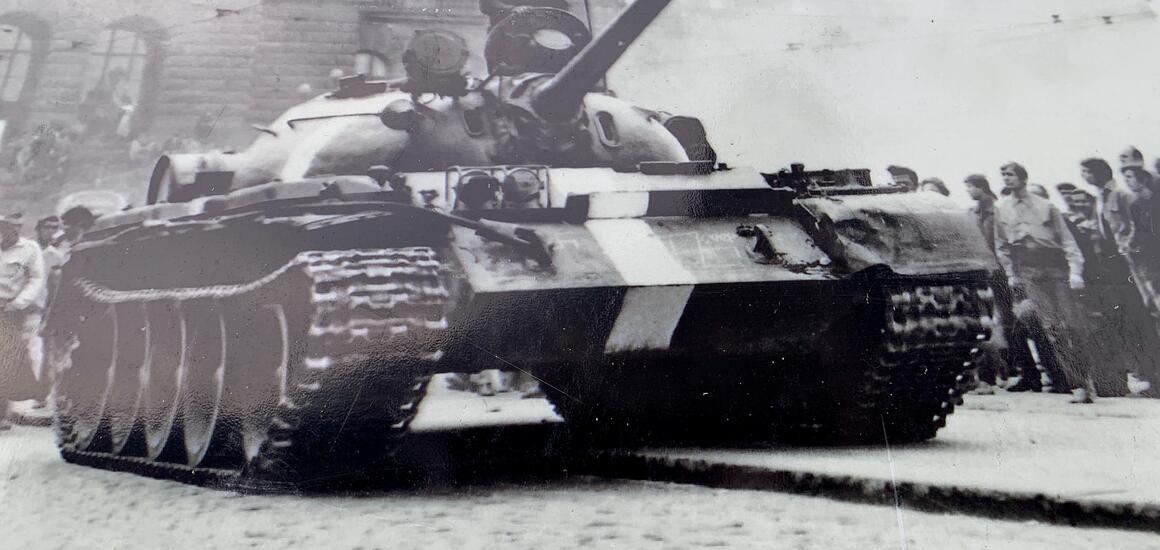
DATE OF ENTRY: 9th July 2024
COMMENTARY: The Prague Spring of 1968 was a significant political event in former Czechoslovakia that symbolised a brief period of political liberalisation and mass protest against the Soviet-dominated communist government. This period of Czechoslovak history, which spanned from January until August 1968, aimed at creating "socialism with a human face" but instead, sadly, ended with the invasion of Warsaw Pact forces that crushed the reform movement.
BACKGROUND
Czechoslovakia became a communist state in 1948 following a coup d'état led by the Communist Party of Czechoslovakia (KSČ), strongly aligning itself with the Soviet Union. The country followed strict Stalinist policies characterised by central economic planning, political repression and censorship.
ALEXANDER DUBČEK & THE REFORMS
In January 1968, Alexander Dubček became the First Secretary of the KSČ. Dubček was a reformist whose mission was to address the widespread dissatisfaction with the status quo.
Under his guidance, the following key reforms were introduced:
- Political Liberalisation abolishing censorship and allowing for greater freedom of the speech and press;
- Economic Decentralisation measures were introduced to give enterprises more autonomy;
- Democratisation the Action Programme of April 1968 called for a more democratic model of socialism;
- Human Rights respect for human rights and civil liberties;
The reforms gained widespread support across all sections of society with the media playing a crucial role in the dissemination of new ideas and fostering a a culture of debate and critique.
THE SOVIET RESPONSE AND INVASION
The Soviet Union, which at the time was led by Leonid Brezhnev, viewed the reforms with increasing alarm. They feared that Czechoslovakia might exit the Warsaw Pact or perhaps worse, inspire similar movements in other Eastern Bloc countries.
On the night of 20th and 21st August 1968, Soviet and Warsaw Pact troops from Poland, Hungary, Eastern Germany and Bulgaria, invaded Czechoslovakia. The total invasion force amounted to 200,000 troops and 2,000 tanks.
Dubček and other Czechoslovak leaders were arrested and taken to Moscow. Under great pressure they agreed to roll back the reforms.
A man called Gustáv Husák replaced Dubček as the leader of the KSČ and a period of "normalisation" was introduced which restored a hard line communist regime and reversed all the Prague Spring reforms.
The invasion demonstrated the limits of Soviet tolerance for deviation within its sphere of influence and reaffirmed the Brezhnev Doctrine which asserted the right of the Soviet Union to intervene in any socialist country threatened by internal or external forces counter to socialism.
LEGACY
The Prague Spring left a lasting legacy on Czechoslovakia, and fostered a national identity and a long-term desire for reform and greater freedoms. The Prague Spring also led to an increase in the emigration of citizens who could see what they yearned for "at home" elsewhere in the world.
The invasion by the Soviet and Warsaw Pact countries was widely condemned internationally and led to a cooling of relations between the Soviet bloc and the West. However, and perhaps more importantly, it also demonstrated the limitation of Western intervention in Eastern European affairs during the Cold War.
The ideals espoused during the Prague Spring lived on and later influenced such movements as Charter 77 and the Velvet Revolution of 1989 which eventually led to the ending of communist rule in Czechoslovakia. To this day, the Prague Spring remains a poignant example of the struggle for freedom and reform within an authoritarian regime and the harsh realities of Cold War geopolitics.
CHARTER 77
Charter 77 was an informal civic initiative in Czechoslovakia, formed in January 1977, which criticized the government for failing to implement human rights provisions in various international documents, including the 1975 Helsinki Accords and the Czechoslovak Constitution. Here are the key points about Charter 77:
-
Origins and Purpose: Charter 77 emerged in response to the arrest and trial of members of the rock band The Plastic People of the Universe, which was seen as a violation of cultural and human rights. The initiative aimed to hold the government accountable for its human rights violations and to advocate for political reform and greater respect for civil liberties.
-
Founding Members: The document was initially signed by 242 individuals, including prominent intellectuals, artists, and dissidents such as Václav Havel, Jan Patočka, and Jiří Hájek.
-
Content of the Charter: The Charter itself was a manifesto that called for the respect of human rights and fundamental freedoms as guaranteed by international agreements and the Czechoslovak Constitution. It did not propose specific political changes but emphasized the need for the state to adhere to its legal commitments.
-
Government Reaction: The Czechoslovak government viewed Charter 77 as a subversive document and responded with a harsh crackdown on its signatories. This included arrests, surveillance, job dismissals, and public vilification campaigns.
-
Impact and Legacy: Despite the repression, Charter 77 gained international attention and solidarity from human rights organizations and Western governments. It played a crucial role in the dissident movement in Czechoslovakia and laid the groundwork for future democratic reforms. It inspired other opposition movements in Eastern Europe and contributed to the eventual collapse of the communist regime in 1989 during the Velvet Revolution.
Charter 77 remains a symbol of peaceful resistance and the fight for human rights and democracy in Czechoslovakia and beyond.
PLEASE NOTE - IMPORTANT
The photographs attached to this article are for illustrative purposes only and are borrowed from public records and historical archives. The photographs are not for sale.































Add new comment